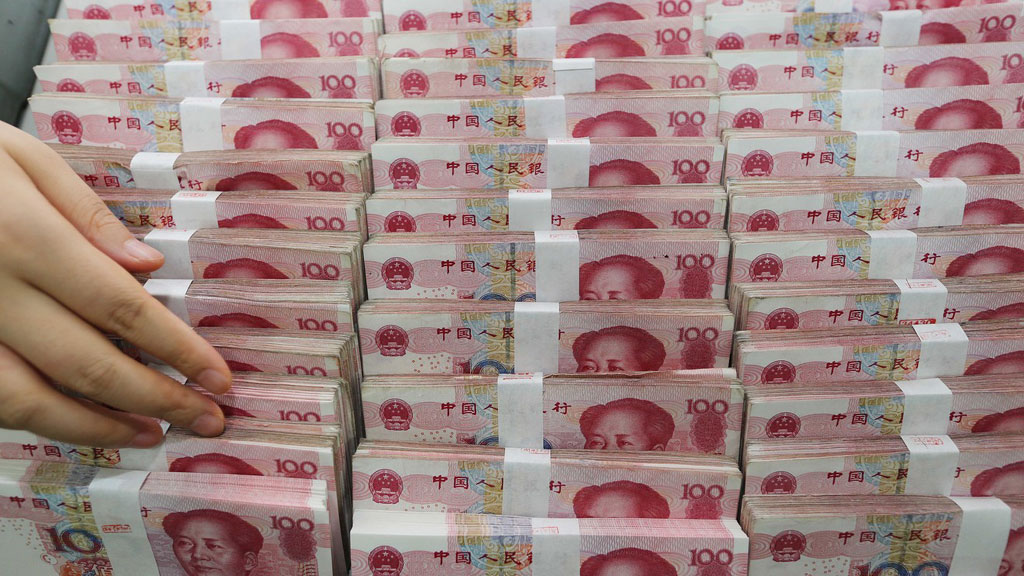 HONG KONG/SHANGHAI: Chinese markets slumped on Friday, with investors rushing for cover after US President Donald Trump slapped fresh tariffs on China citing a lack of progress in their trade talks.
HONG KONG/SHANGHAI: Chinese markets slumped on Friday, with investors rushing for cover after US President Donald Trump slapped fresh tariffs on China citing a lack of progress in their trade talks.
Trump said on Thursday he would impose 10% tariffs on the remaining $300 billion of Chinese imports from Sept. 1, breaking a ceasefire in the trade war since his meeting with Chinese President Xi Jinping at the G20 summit in June.
The US leader said Xi was moving too slowly in the negotiations, after being briefed by US Trade Representative Robert Lighthizer and Treasury Secretary Steven Mnuchin on their meeting with Chinese officials this week, which were the first such in-person talks since the June trade truce.
Beijing will take countermeasures if the US tariffs go ahead, the country's foreign ministry said on Friday afternoon.
Chinese shares plummeted with the Shanghai Composite Index falling 1.4%, down 2.6% for the week. The blue-chip CSI300 fell 1.5%. In Hong Kong, the Hang Seng Index closed down 2.4%, entering 'oversold' territory for the first time in almost two months.
As investors sought sanctuary from volatility in safer assets, the 10-year Chinese government bond yield fell to 3.1%, its lowest since early April.
"The market is not prepared for this. No one is prepared for this," said Khiem Do, head of Greater China Investments at Barings. "It is not easy to estimate the impact on earnings per share for (Chinese) A-shares or H-shares, but the impact on sentiment is immediate."
The Chinese yuan slid to its weakest since November 2018 in early trade, before paring some losses.
Onshore spot finished the domestic session at 6.9416 per dollar, its weakest close since Nov. 30, 2018. It was down almost 0.8% earlier on Friday - its biggest daily fall in more than two months. The offshore yuan was trading down 0.3% at 6.9720 at 0832 GMT.
Traders said the yuan's slump was encouraged by a weaker-than-expected official fixing, from which the spot can only trade 2% above or below. The People's Bank of China set the midpoint at a seven-month low on Friday.
"The deteriorating China growth outlook amid the full-blown trade war suggested that the Chinese government would be tempted to allow further renminbi depreciation to support the growth," Ken Cheung, senior Asian FX strategist at Mizuho, wrote in a note on Friday.
But given China's priority for stability, Cheung said the PBOC might use the CNY fixing to guide a gradual depreciation towards 7 per dollar. Traders believe the yuan would steady if the PBOC keep the midpoint on the stronger side of 6.9.
Trump's latest threat comes just two weeks after China's second quarter economic growth slowed to 6.2%, its weakest pace in at least 27 years.
Analysts expect the continuing stand-off to be a drag on China's economy but also present trading opportunities.
Beijing could retaliate by curbing rare earth exports, excluding certain US companies from doing business in China and increasing existing tariffs on US goods, Iris Pang, economist for Greater China at ING, said in a note on Friday.
Zhou Yu, analyst at Pacific Securities, said in a note on Friday investors should bet on agriculture products, a sector where tariffs could drive domestic businesses to buy local.
Rare earth and agriculture stocks surged, with Hong Kong-listed China Rare Earth Holdings Ltd rising as much as 30%.
All 25 stocks on China's NASDAQ-style tech board, which started trading last week, rallied on Friday, with top gainer Raytron Technology hitting the upper limit of 20% at the close.
The board is seen by some as the answer to US sanctions on Chinese technology companies.
"The government is guiding money into the technology sector, which is key in the trade war with the United States," said Wu Kan, head of equity trading at Shanshan Finance.



















Comments
Comments are closed.